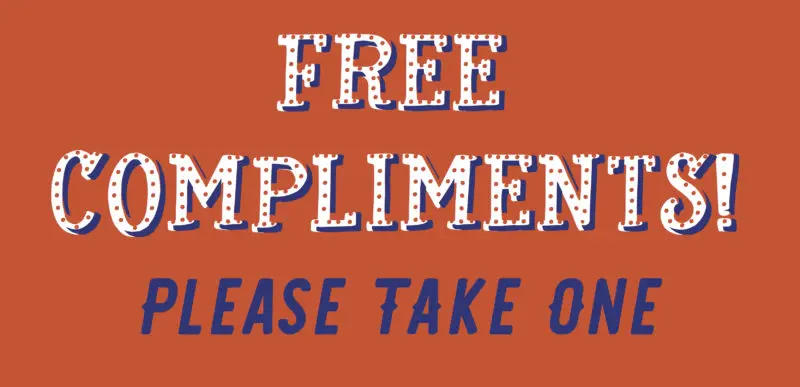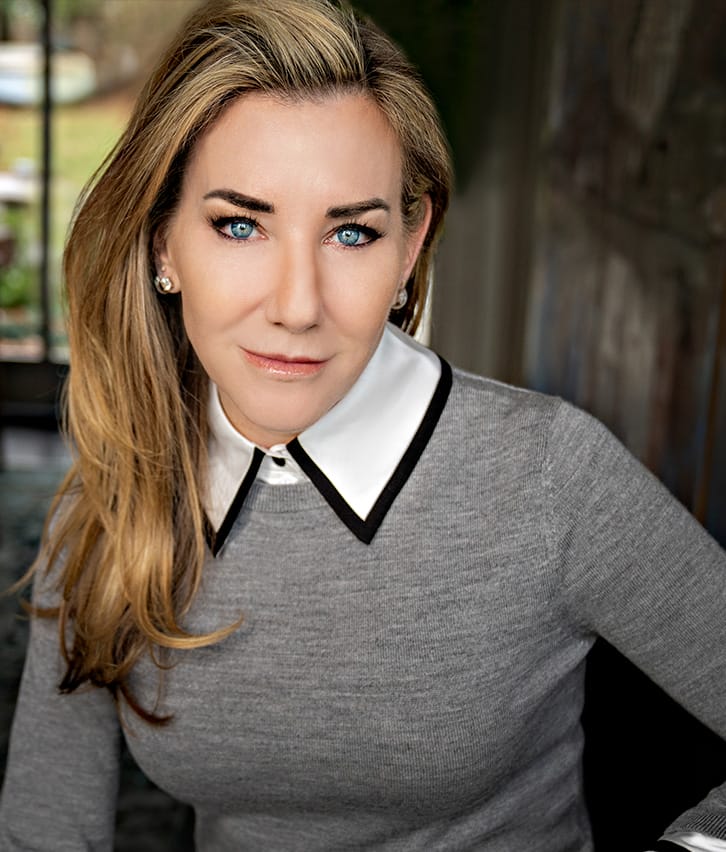Compliments…. eek… so awkward!
But, wait… did you ever get a compliment that stopped you in your tracks?
You! Yeah, you! You are amazing. But, not just any old kind of amazing. You are the kind of amazing that makes me want to be more amazing, too. You motivate me, and you inspire me.
Oh, and you’ve got a nice butt.
Few things feel as good as a damn good compliment. Mark Twain once famously said that he could live two months on a good compliment.
I’m the same. Two months, easy. And, if it’s really kick-ass, and I mean a knocks-your-socks-off, takes-your-breath-away compliment: well, maybe even three. I’m a sucker for the sweet talk.
So, how do some people effortlessly pull off the charm offensive while others are just plain offensive?
First, let’s dispatch of that horror show known as the shitty compliment. You know what I’m talking about: those generic puffs of nothingness doled out to any and all, with the express intent to schmooze, snow, or bamboozle. They are, hands down, the worst, actually undermining credibility, worsening relationships, and just plain sucking the life out of the person being complimented (and, I suspect, the person doing the complimenting as well).
But, what are good compliments?
A good compliment is sincere, specific, and special. It marks an unfeigned connection between the person giving and the person receiving. It comes from knowing and understanding each other. It is generous, and it is kind. And, it is a gift, something not heard every day, a little burst of warmth and love that can soften even the hardest of hearts. (See above: three months.)
It’s the difference between “You’ve got nice eyes” and “I love how your eyes light up so fantastically when you talk about this thing that really moves you.” It’s the difference between “You’re great” and “Being around you makes me want to be great, too.” It’s the difference between “Can I ask you a question?” and “You are a such an expert, I would really be honored to have a moment for your advice.”
And yet, so many of us fail and flop in the compliments department. Why is this? And, more importantly, how can we do better?
It comes down to two simple things: awareness and verbalization.
First, let’s take awareness. Often, we don’t even think of compliments (at least not in the moment) because insecurity wields its sword and cuts us off at the knees. We are neither present nor attentive, busying our brains worrying what other people are thinking about us. Newsflash: they are doing the same thing. And, one minus one always equals zero. Quit being so narcissistic, focus on the other person instead of yourself, and start building actual relationships.
Genuine compliments are a foundation on which authentic connections are made. Complimenting someone’s dress isn’t the same of complimenting their sense of style, as manifested by said dress. You can comment on the what (the nice dress) or the why (the sense of style), but it is only the latter that is memorable.
We can also use compliments to inspire and encourage others. Let’s face it, when you strip away our ability to stand upright and use kitchen utensils, we are basically a bunch of puppies and toddlers; we respond better to positive reinforcement than punishment. Make someone feel good, and they’ll come back for more. Make someone feel terrible, or uncertain or insecure, and you’ll have to do twice as much work to get the same result next time.
And, once you’ve begun to inspire and encourage, you can use the power of the energy derived from the compliments to increase your influence. Finding sincere, specific, and special things to say to people will make them want to be around you. That gives you power and, not only that, power among people whose behavior you have already begun to influence. Pretty sneaky, sis.
So, what’s holding you back from sharing the love? This brings us to our next step: verbalization.
Maybe you are shy and don’t realize you aren’t actually saying the words out loud. Maybe you are self-absorbed and don’t realize you aren’t actually saying the words out loud. Maybe you are introverted, competitive, inarticulate, awkward, and don’t realize that you aren’t saying the words out loud.
Or maybe you think you will just sound fake, breezy, unserious.
Bottom line: we can’t hear you. And, we want to hear you.
I’m going to challenge you to start verbalizing compliments: one a day, for the next ten days. And, I’m even going to give you choices on which type of compliment to try. Go ahead, go nuts, there’s no extra charge for sprinkling a little joy.
1. Use compliments to convey gratitude. After a recently personal success, I reflected on the handful of people who supported me — I mean really encouraged, inspired, assisted me. I sent each a note thanking them for the role they played, and complimented them on the skill and talent they exhibited to me and for me in the process. I could never have done it alone, and I felt that I owed them not just my gratitude, but gratitude in a way that called out their specialness. Each replied that they were left without words, that I have made their day with my note, and that it was incredibly meaningful to them. It felt damn good to send those notes. I know it felt damn great to receive those notes. Each was true, and each was real. Sending was as much a gift to me as it was to them.
2. Look for patterns. Is there someone in your life who consistently impresses you, perhaps with how they dress, what they achieve, who they have become? Think about what is behind each of these manifestations: their sense of style, their discipline, their motivation. The odds are, the success that comes from these patterns is no accident. Compliment that deeper driver, and they will know that you, unlike most everyone else, really see them.
3. Start small. Your compliment doesn’t have to be big. A small but sincere offering beats the biggest blowing of smoke-up-your-butt nonsense any day of the week. Good things come in small packages.
4. Catch them being good. We’ve all been in conversations where someone brings up something lovely about a mutual acquaintance. Take note, and pass along that praise. Compliments given in absentia often feel more genuine because they are relayed without agenda. If you can’t find your own words, borrow (with credit) someone else’s.
5. Praise in public. A corollary to the meaningfulness of private but relayed praise is praise given in public. Compliments given in front of others, especially those who have influence, can amplify your message and make the person you are complimenting feel even more special.
6. Make it personal. The compliment itself should always be about them, but it’s wonderful to tell someone how one of their positive attributes influenced you for the better. Many of us toil in darkness, improving ourselves one step at a time, assuming no one appreciates the hard yards. It is a delight to be truly seen for the work we put in when no one is watching. Notice that, and mention that you are doing the same; you might even get some extra help in your own journey. Misery loves company, after all.
7. Use it as a transition. If you can’t come up with something during the conversation, or if there is no natural moment to insert the compliment — I’m sensing your awkwardness here — you can always use it as a transition as the conversation is ending. It can be just as powerful to comment to someone about how much you enjoyed your time together, and how much you like talking to them, as it is to praise their scarf. Plus, it allows you to gracefully end a conversation, and on a high note, to boot. (Awkwardness, be gone!)
8. Just say it. Sadly, many of us reserve our compliments because we think that we’ll sound silly, stupid, or suck-uppy. Nothing could be further from the truth when compliments are sincere, specific, and special. We think of nice things, but we keep them to ourselves. Selfish and tragic, I say. If you have something nice to say, by all means, just say it. It might not come out perfect, but it beats keeping it inside your head. For you, and for them.
And, by the way, your butt? Really, it’s lovely.



